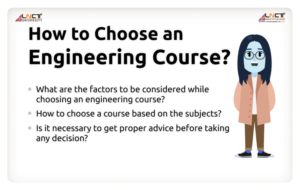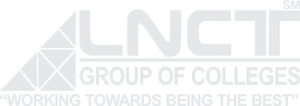Index –
- Introduction
- Assessing Your Interests and Skills in the Context of Engineering Courses:
- Future Job Prospects and Industry Trends
- Considerations for Education and Specializations
- Evaluating Personal Goals and Values for making an informed decision
- Conclusion
Introduction:
Choosing the right engineering course is a crucial decision that can shape your career and pave the way for exciting opportunities. Factors such as your interests, skills, future job prospects, industry trends, and educational opportunities all play a role in finding the perfect engineering course.
We will provide an overview of the major engineering disciplines, highlighting their unique features and career opportunities. You’ll learn how to assess your interests and skills to identify the engineering fields that align with your passions.
Additionally, we’ll delve into considerations for education and specializations, examining curriculum requirements, research opportunities, and industry collaborations. We’ll discuss the importance of seeking guidance and advice from professionals and academic advisors, as well as evaluating personal goals and values to ensure your chosen engineering course aligns with your long-term aspirations.
So let’s embark on this journey together and discover the engineering course that will shape your future.
Assessing Your Interests and Skills in the Context of Engineering Courses:
It’s important to reflect on what genuinely excites you and aligns with your natural abilities. Let’s explore how you can assess your interests and skills in the context of engineering courses.
First, take some time to think about the engineering disciplines that intrigue you the most. Consider the areas of engineering that spark your curiosity or make you feel eager to learn more. Are you drawn to the mechanics of machines, the design of structures, the intricacies of electrical systems, the chemical processes, the world of computers, the wonders of aerospace, or the intersection of engineering and healthcare? By identifying the disciplines that capture your interest, you can narrow down your options and focus on the engineering courses that align with your passion.
Next, evaluate your skills and aptitudes. Reflect on the subjects and activities that you excel in or enjoy. Consider your strengths and talents, as they can guide you toward the engineering disciplines that capitalize on those abilities. For example, a computer science and engineering course might be a perfect match if you have strong problem-solving skills and enjoy working with computers.
It’s also essential to think about how your interests and skills align with the real-world applications of engineering disciplines. Research the various engineering courses you’re considering and explore their practical implications. Look for examples of projects, industries, and career opportunities associated with each discipline. For instance, if you’re passionate about sustainability and environmental issues, you might find that studying civil engineering with a focus on environmental engineering can provide you with the knowledge and skills to tackle those challenges.
Additionally, consider any relevant academic or extracurricular experiences you’ve had. Have you participated in robotics competitions, conducted scientific experiments, or worked on engineering-related projects? These experiences can provide valuable insights into your compatibility with specific engineering disciplines. They can also serve as a basis for further exploration and specialization within your chosen engineering course.
Remember that your interests and skills may evolve, and it’s okay to explore multiple engineering disciplines before making a final decision.
Future Job Prospects and Industry Trends in the Context of Engineering Courses:
By staying informed about the current and projected demand for different engineering disciplines, you can make a well-informed decision that sets you up for a rewarding and successful career. Let’s explore the future job prospects and industry trends within the context of engineering courses.
- Researching the Job Market:
Start by researching the job market for the engineering disciplines you’re interested in. Look for information on employment rates, salary ranges, and demand for professionals in those fields. Identify the industries and sectors that are expected to experience growth and increased opportunities for engineers. For instance, renewable energy, sustainable infrastructure, artificial intelligence, and biotechnology are all sectors that are expected to see substantial growth, creating a demand for engineers with specialized knowledge and skills.
- Identifying High-Demand Engineering Fields:
Some engineering disciplines are experiencing higher demand than others due to evolving technological trends and global challenges. Consider fields such as environmental engineering, software engineering, biomedical engineering, and renewable energy engineering, which are expected to see significant growth in the coming years. By choosing an engineering course that aligns with these high-demand fields, you can increase your chances of finding rewarding job opportunities upon graduation.
- Considering Future Advancements and Emerging Technologies:
Engineering is at the forefront of innovation and technological advancements. Fields such as robotics, artificial intelligence, the Internet of Things (IoT), cybersecurity, and data science are rapidly evolving and presenting exciting opportunities for engineers. Stay updated on these trends and consider engineering courses that equip you with the skills needed to thrive in these emerging areas.
- Adapting to Changing Industry Needs:
Industries are continually evolving to address global challenges and changing consumer demands. Look for engineering courses that incorporate interdisciplinary knowledge and skills. For example, the integration of sustainability practices, digital technologies, and data analytics is becoming increasingly important across various engineering fields.
- Considering the Global Perspective:
Engineering is a global field, and job prospects can vary by geographic region. Research international job markets and consider the global demand for engineers in your chosen discipline. Look for opportunities to gain international exposure through exchange programs, internships, or study abroad experiences. Being aware of global industry trends can expand your career options and open doors to exciting opportunities worldwide.
It’s important to note that while future job prospects and industry trends provide valuable insights, they are not the sole factors to consider when choosing an engineering course. Finding a balance between your passions and the demand for certain engineering disciplines will help you carve out a successful and fulfilling career.
By considering future job prospects and industry trends, you can make an informed decision about which engineering course to pursue. Stay informed, be adaptable, and embrace lifelong learning to thrive in a rapidly evolving engineering landscape.
Considerations for Education and Specializations in the Context of Engineering Courses:
Once you have identified your interests and evaluated the prospects of engineering disciplines, it’s crucial to delve deeper into the considerations for education and specializations within your chosen engineering course. Each engineering discipline offers various specializations and educational paths that can shape your expertise and career trajectory. By exploring these considerations, you can make an informed decision about the specific engineering course and specialization that aligns with your goals and aspirations.
- Analyzing Curriculum and Course Requirements:
Begin by thoroughly examining the curriculum and course requirements of the engineering courses you are considering. Look for a curriculum that strikes a balance between theoretical knowledge and practical applications. Assess the core subjects, elective options, and hands-on experiences provided by each course. Additionally, evaluate the availability of specialized courses or concentrations within the engineering discipline that pique your interest.
- Investigating Specialization Options within Engineering Disciplines:
Engineering disciplines often offer various specializations that allow you to focus on specific areas of expertise. For example, within civil engineering, you might have the option to specialize in structural engineering, transportation engineering, or environmental engineering. Research the available specializations within your chosen engineering course and explore their respective career paths, industry demands, and the skills they require. Consider how each specialization aligns with your interests and long-term goals to find the best fit for you.
- Exploring Research Opportunities and Industry Collaborations:
Consider the research opportunities and industry collaborations available within the engineering course you are considering. Research experience can provide valuable hands-on training, exposure to cutting-edge technologies, and the chance to work on innovative projects. Look for universities or programs that emphasize research and have partnerships with industry organizations. Engaging in research and collaboration can enhance your learning experience, expand your network, and open doors to exciting career prospects.
- Assessing Practical Training and Internship Opportunities:
Practical training and internships play a vital role in preparing you for the real-world challenges of engineering. Look for engineering courses that offer internships, cooperative education programs, or industry placements as part of the curriculum. These experiences provide valuable hands-on learning, allow you to apply theoretical knowledge in practical settings, and provide opportunities to build professional connections. Practical training can also give you a competitive edge when entering the job market.
- Considering Accreditation and Professional Recognition:
Accreditation and professional recognition are important factors to consider when choosing an engineering course. Accreditation ensures that the course meets certain quality standards and is recognized by professional engineering bodies. This recognition is essential for licensure and professional registration in many countries. Research the accreditation status of the engineering course you are considering and check if it aligns with your career goals and aspirations.
- Evaluating Faculty Expertise and Support:
The expertise and support provided by the faculty can significantly impact your learning experience. Research the qualifications, research interests, and industry experience of the faculty members within the engineering course you are considering. Look for a diverse faculty with expertise in relevant areas.
By considering these factors, you can find an engineering course that not only aligns with your interests but also provides the educational framework and specialization options that set you up for success. Remember to balance your academic pursuits with practical experiences, research opportunities, and industry collaborations to maximize your learning and professional development within your chosen engineering course.
Evaluating Personal Goals and Values along with Making an Informed Decision in the Context of Engineering Courses:
Choosing the right engineering course is not just about considering academic and career prospects; it’s also essential to evaluate your personal goals and values. By aligning your personal goals and values with your choice of engineering course, you can create a fulfilling and purpose-driven career. Let’s explore how you can evaluate your personal goals and values to make an informed decision about the engineering course that resonates with you.
- Consider Your Aspirations and Long-term Goals:
Reflect on your aspirations and long-term goals. What do you hope to achieve through your engineering career? Do you have a desire to contribute to sustainability and environmental conservation? Are you passionate about improving healthcare and enhancing the quality of life? Do you see yourself leading innovative projects or entrepreneurial ventures? Understanding your aspirations can help you identify the engineering course that aligns with your broader ambitions and provides a pathway to realize your goals.
- Reflect on the Societal Impact of Engineering:
Engineering has a profound impact on society, and it’s important to consider the type of impact you want to make. Reflect on the societal challenges that resonate with you, such as addressing climate change, improving access to clean water, or advancing technological innovations for the greater good. Look for an engineering course that emphasizes these areas and equips you with the skills and knowledge to contribute meaningfully to society.
- Evaluate the Alignment with Your Values:
Consider your values and how they align with the engineering discipline you are considering. For example, if sustainability is a core value for you, exploring engineering courses that emphasize renewable energy, green building practices, or environmental conservation might be a natural fit. If ethical considerations are important to you, look for courses that integrate ethical frameworks and encourage responsible engineering practices. Evaluating the alignment between your values and the engineering course can lead to a more fulfilling and purpose-driven career.
- Reflect on Work-Life Balance and Personal Well-being:
Engineering careers can be demanding, and it’s crucial to consider your work-life balance and personal well-being. Reflect on your desired lifestyle, family commitments, and personal interests outside of work. Evaluate how different engineering disciplines and their associated careers align with your desired balance. Some disciplines may offer more flexible work arrangements or opportunities for remote work, while others may require more on-site or travel-intensive roles.
- Seek Authenticity and Passion:
Passion and authenticity are vital ingredients for a successful and fulfilling career. Consider the engineering discipline that truly ignites your curiosity and excites you.
Remember that the most satisfying and rewarding career paths often result from a harmonious blend of personal fulfillment, societal impact, and professional growth. By evaluating your personal goals and values alongside academic considerations, you can make an informed decision that sets you on a path toward a fulfilling engineering career.
Conclusion:
Throughout this journey, we have explored various aspects to consider when making this important choice. From assessing your interests and skills to understanding future job prospects and industry trends, we’ve emphasized the importance of aligning your personal goals and values with your chosen engineering course.
Remember, it’s not just about finding a course that offers promising career prospects or aligns with market demands.
Choosing an engineering course is a deeply personal and unique decision. What works for someone else may not necessarily be the best fit for you. Embrace your authenticity and follow your passion. Seek a course that sparks curiosity, ignites your enthusiasm, and enables you to make a meaningful contribution to society.
Remember, your journey in engineering doesn’t end with selecting a course. It’s an ongoing process of growth, learning, and adaptation. Remain open to new opportunities, emerging technologies, and interdisciplinary collaborations. Continuously seek personal and professional development throughout your academic journey and beyond.
So, take all the insights you have gained from assessing your interests, exploring industry trends, considering specializations, aligning with your values, and making an informed decision that resonates with your unique aspirations. Be confident in your choice and embrace the exciting path that lies ahead.
Best of luck as you embark on this exciting adventure in the world of engineering!





